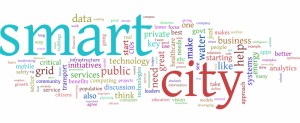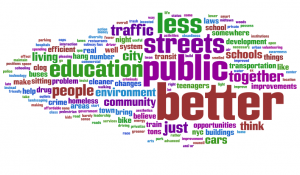05 December 2013 | Posted by Students of Business and Technology
Smart Cities: What will the Future hold for our Urban Landscape?

Globalisation and technological changes are having a profound impact on housing, economy, culture, social, and environmental conditions in urban environments. The lecture introduced some of changes that are already taking place and others that will shortly modify our urban landscape. Guest speaker series part 2. Interviewee; Laurentit Neamtu Phd - Academic Director La Salle Almere, The Netherlands. Subject; Smart Cities.
Luke: How would you rate Barcelona as a smart city? It was ranked 10th on the list of best smart cities, but do you feel that there may be room for further improvements or do you feel it's developing quite quickly as a smart city? Laurentit: Well, this is more of a political issue, so depending on who is governing Barcelona they can choose whether they want the city to develop in a quicker or slower way. Barcelona has a lot of opportunities because of the climate, so a lot of things can be done. The position, ranking 10th, considering the criteria they use, that is okay. They have the technological district, Arroba 22, where they try to do things, but I know it is not working at 100% like it should be, and they are still having some technical issues. But its not an immediate solution, we have to convince people of the necessity of having a smart city, and if people are not getting involved then you cannot succeed. You can always have technology, but economic issues such as who is going to invest in the technologies is still a problem. You need to convince people of the benefits of having a smart city to combat legislation and economic issues. Luke: How important are smart cities in the developing world? What do they offer us as individuals and how will they affect our daily lives? Laurentit: Well, in coming generations we will have a huge portion of the population living in cities, so we have to do something to allow people to live in more comfort, and to allow people more space, so it is an important issue. We need an efficient organisation of cities, we need effective legislations, we need to be tolerant, we need to accept people from different cultures, and we need to be able to integrate. Its a necessity because we don’t have enough space on this earth, and if your not able to collaborate or be tolerant, we're going to have a problem. We have to find a way to live with the resources we have, to make the resources available to our children, and actually to keep the viability of the earth for future generations. We have to be smart, and need know how to use our resources, and we need to be responsible more than anything. Luke: Is it only possible to create smart cities in a developed county or in modern cities? Laurentit: Yes this is exactly the reason why I used the example of the smart phone from the Congo. Technology and economics is important of course, but it's people and how they contribute to the governance of the cities, and how they are involved in the day to day problems that is the most important factor. Its a people problem more than anything. You can have a smart city without computers. If you have a good understanding, a good tolerance, and work well together, thats enough, this is being smart. It's not necessarily technologically smart, but its still smart. In the case of a big city, or a technological advanced city, you need to use technology in a smart way, but if you don’t have it, its not compulsory.

Add new comment